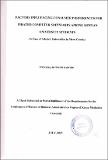| dc.description.abstract | The massive increase of computer software piracy by consumers has raised a major concern. The aim of the study was to determine the factors influencing consumer's preference for pirated computer software's among Kenyan University students; a case of selected Universities in Meru County. Computer software piracy includes number of related practices such as illegal copying of programs, selling and purchasing of pirated computer software's. Consumer behavior towards piracy is a unique phenomenon and it cannot be compared to other products such as commodities and branded goods, since pirated goods poses normal implications for the consumers. There are a number of factors influencing consumers' preferences for pirated computer software's among Kenyan Universities but this study explored the key selected factors. This included: price, social influence, software's availability and customer information. Owing to the average low income, students are an important user group for pirated computer software's. To examine the behavioral patterns of consumers' preference for pirated computer software's, the study focused on cultural, religious and traditional background of the consumers. The study also highlighted on various terms related to piracy as defined by the current literature, an overview of piracy in global context as well as the categories of piracy available in the current market. It also discussed on the consumer behaviors in relation to the pirated computer software's, the issues of software piracy, the risks of using pirated product and copyright infringement of software and finally the empirical studies related to the research carried out by other researchers. Descriptive research design was adopted for the research in order to describe factors influencing consumer's preference for pirated computer software's among Kenya University students. The study focused on the full time students from the faculty of Computer Science of Meru University of Science and Technology which was 1,300 students and Kenya Methodist University full time students which was 120 students, out of which the target population of 10% of total population was selected, therefore the sample size was 142 students. Simple random sampling method was used for the research. This was then coded into the computer using SPSS (Statistical Package for Social Science) software the data obtained was then analyzed through descriptive statistics such as percentages ranking and averages. The result was then presented in form of charts, tables and graphs. The study found that most of the students did not believe software piracy was something wrong and it also concluded that price, social influence, software availability and consumer information were the main factors that encouraged preference for pirated computer software's. | en_US |

